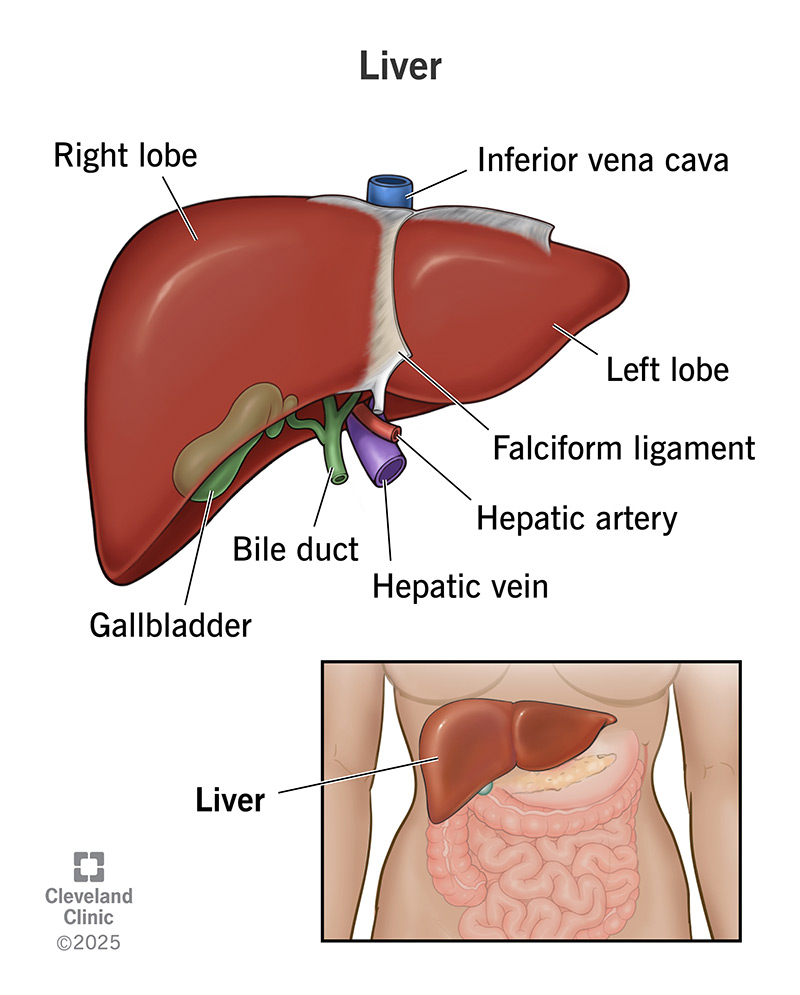Your liver performs more than 500 important functions, from filtering blood and processing nutrients to fighting infections. It creates bile and important proteins your body needs. You can’t live without a liver: If your liver fails, you’ll need an organ transplant to survive.
Advertisement
Cleveland Clinic is a non-profit academic medical center. Advertising on our site helps support our mission. We do not endorse non-Cleveland Clinic products or services. Policy

Image content: This image is available to view online.
View image online (https://my.clevelandclinic.org/-/scassets/Images/org/health/articles/21481-liver.jpg)
Your liver is the largest internal organ in your body and one of the only organs that can regenerate itself. The liver plays a crucial role in filtering blood, storing energy and producing bile for digestion.
Advertisement
Cleveland Clinic is a non-profit academic medical center. Advertising on our site helps support our mission. We do not endorse non-Cleveland Clinic products or services. Policy
Unfortunately, hundreds of diseases and conditions can damage your liver so it can’t work. Some of these can be life-threatening. Hepatologists, medical specialists who diagnose and treat liver disease, can treat and sometimes cure these diseases. And there are many things that you can do to keep your liver well and working as it should.
Video content: This video is available to watch online.
View video online (https://cdnapisec.kaltura.com/p/2207941/sp/220794100/playManifest/entryId/1_tvodsw7y/flavorId/1_5f3sgelj/format/url/protocol/https/a.mp4)
Your liver is the biggest organ in your body, and it performs hundreds of functions every day.
Your liver’s biggest job is filtering harmful substances and waste from your blood. Every day, your liver filters more than 250 gallons of blood. If that wasn’t enough, and among many other duties, your liver also:
Your liver is on the right side of your upper body. It’s located under your ribs, just next to your stomach.
Advertisement
Your liver looks like a spongy, reddish-brown wedge of tissue. The wedge, which may be about the size and shape of a football, may weigh between 3 and 5 pounds.
The liver has two lobes (sections). The lobe on the right is slightly larger than the lobe on the left. Both lobes contain many blood vessels and thousands of smaller lobes (lobules) that are tiny clusters of liver cells (hepatocytes).
Some of the important parts of your liver anatomy include:
There are over 100 types of liver diseases, but they fall into a handful of subtypes. Examples include:
Common early symptoms of liver problems include:
When liver disease is more advanced and your liver function declines, you may develop many other symptoms, like:
Healthcare providers may use a combination of tests to check on your liver or to diagnose liver diseases, like:
Different treatments are available to treat different liver diseases, including medications and surgery. The most common — and important — treatment for liver disease is reducing stress on your liver through diet and lifestyle changes. If liver disease reaches the end stages, you’ll need a liver transplant.
Advertisement
To keep your liver healthy and functioning well, you can:
Liver disease symptoms can be vague and may feel like many other diseases. Belly aches and nausea might mean stomach flu rather than liver disease. But stomach pain that doesn’t go away, unintended weight loss and jaundice (yellow eyes and skin) are reasons to contact a healthcare provider.
Your liver does a lot to keep your body working: from filtering hundreds of gallons of blood a day and making important chemicals to breaking down harmful substances. You can help protect your hardworking liver by taking care not to overload it with toxic substances or a liver infection.
Advertisement
Learn more about the Health Library and our editorial process.
Cleveland Clinic's health articles are based on evidence-backed information and review by medical professionals to ensure accuracy, reliability, and up-to-date clinical standards.
Cleveland Clinic's health articles are based on evidence-backed information and review by medical professionals to ensure accuracy, reliability, and up-to-date clinical standards.
If you have a disease that’s affecting your liver, you want expert advice and care. At Cleveland Clinic, we’ll create a treatment plan that’s right for you.
